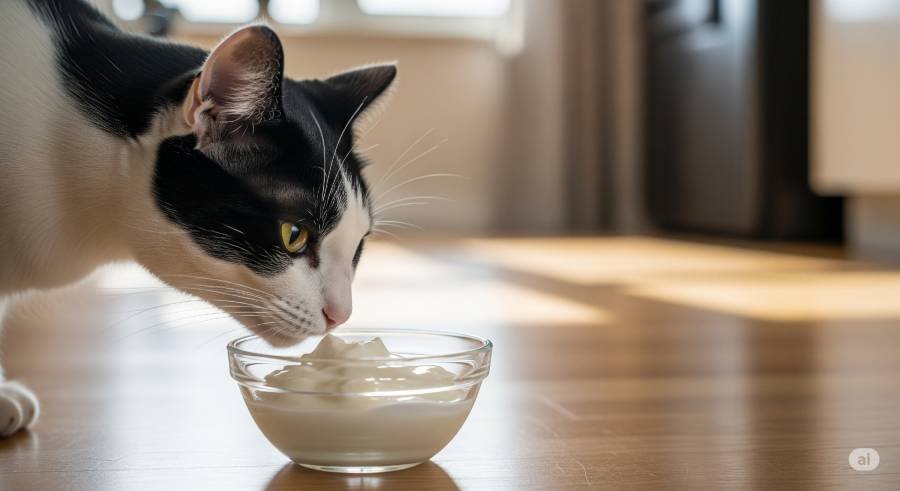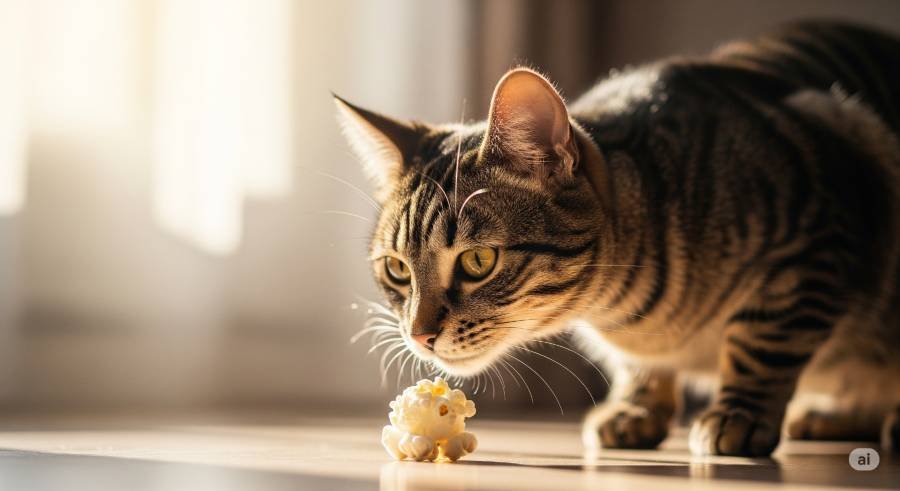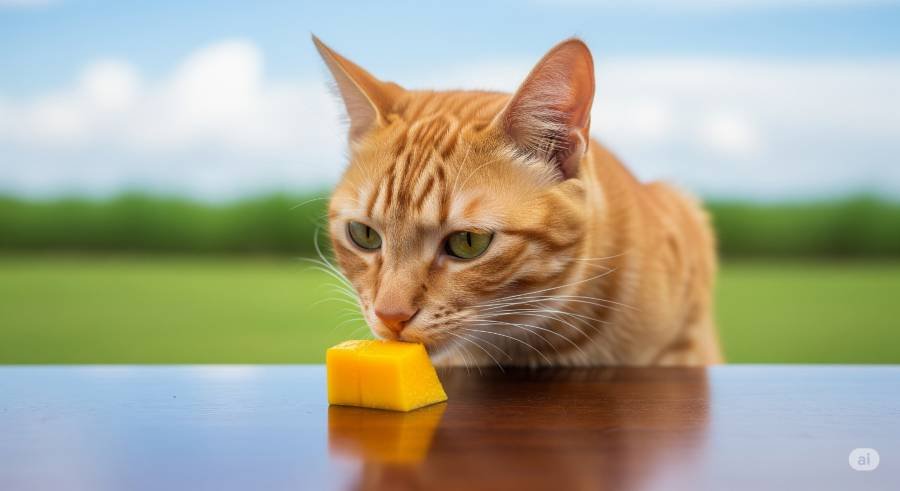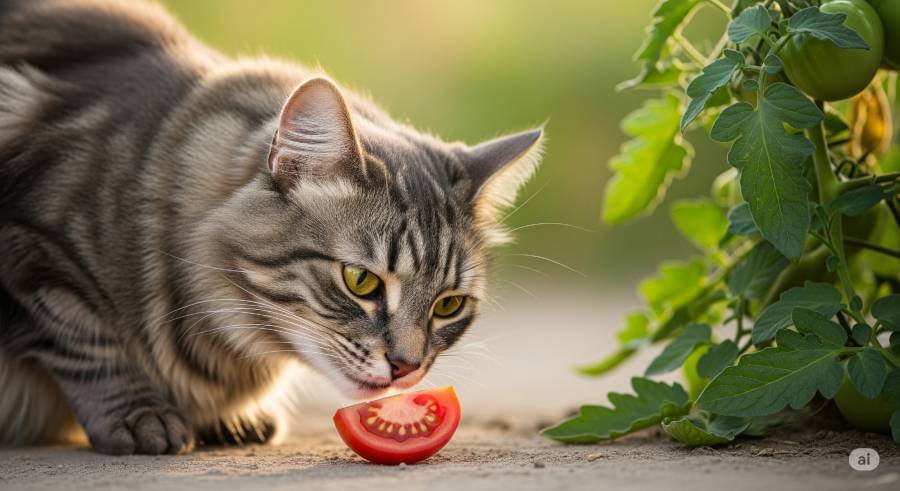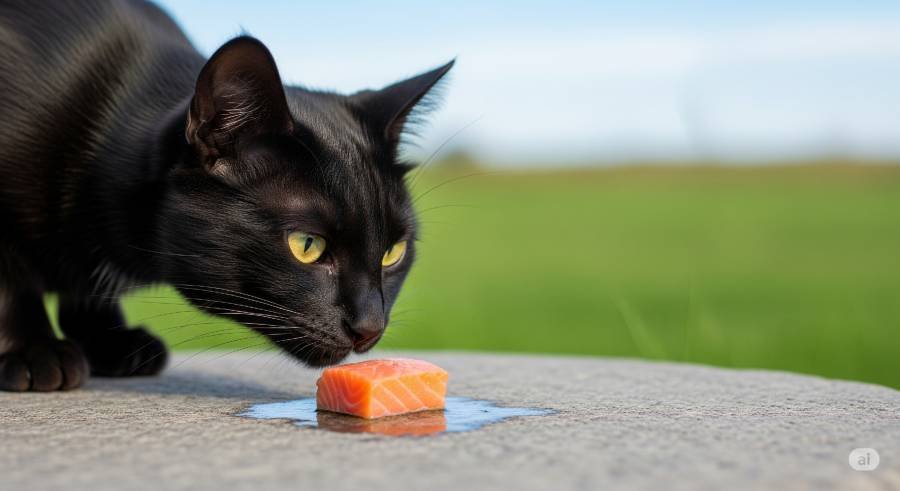Cats can eat blueberries in small quantities as an occasional treat. Blueberries are non-toxic to cats and can provide minor nutritional benefits, but they should not be a significant part of a cat’s diet.
As obligate carnivores, cats primarily require animal-based proteins, and fruits like blueberries are not a natural or essential component of their nutrition.
Below is a detailed guide on the safety, benefits, risks, and precautions for feeding blueberries to cats.
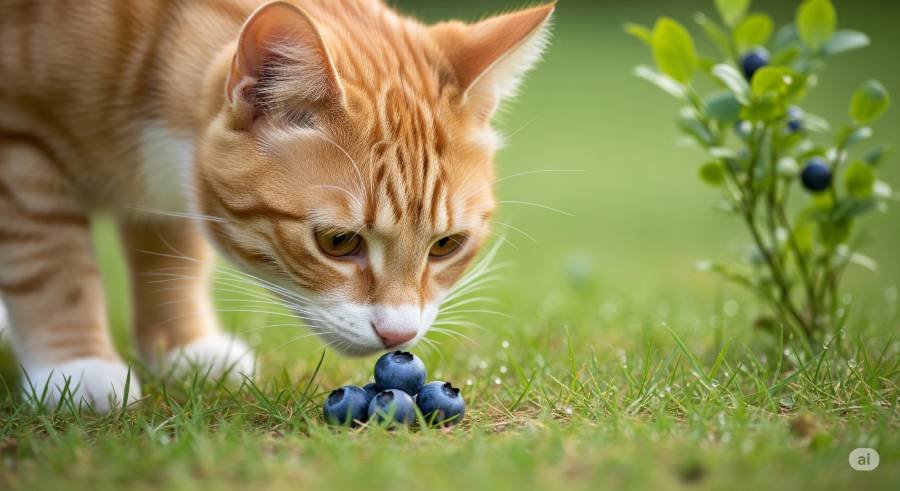
Potential Benefits of Blueberries for Cats
Blueberries contain nutrients that may offer limited benefits when given sparingly:
- Antioxidants: Blueberries are rich in antioxidants, such as anthocyanins, which may help combat free radicals and support overall health. However, cats have different antioxidant needs compared to humans, so this benefit is minimal.
- Vitamins: Blueberries provide vitamins C and K. While cats synthesize their own vitamin C, small amounts of these vitamins are not harmful.
- Fiber: The fiber in blueberries can aid digestion and potentially help with constipation when offered in moderation.
- Low Calories: Blueberries are low in calories, making them a healthier treat option compared to high-calorie commercial treats.
- Hydration: With high water content (about 84%), blueberries can contribute to hydration, especially for cats that don’t drink enough water.
While these benefits exist, blueberries should only be an occasional treat, as cats derive most of their nutritional needs from meat-based diets.
Risks and Dangers of Blueberries for Cats
Blueberries are generally safe, but there are some risks to consider:
- High Sugar Content: Blueberries contain natural sugars, which can cause digestive upset (e.g., diarrhea or vomiting) if consumed in excess. Over time, too much sugar may contribute to obesity or diabetes in susceptible cats.
- Choking Hazard: Whole blueberries, especially if large, can pose a choking risk for cats. Always cut them into smaller pieces or mash them before feeding.
- Allergies or Sensitivities: Some cats may have sensitivities to new foods, leading to gastrointestinal issues or allergic reactions (e.g., itching or swelling).
- Pesticides or Contaminants: Non-organic blueberries may have pesticide residues or bacteria on their skin. Always wash blueberries thoroughly before offering them to your cat.
- Overfeeding: Feeding too many blueberries can upset a cat’s stomach or lead to nutritional imbalances, as fruits are not a natural part of a cat’s diet.
Unlike peaches, blueberries do not have toxic parts like pits or stems, making them safer overall, but moderation is still key.
How to Safely Feed Blueberries to Cats
To ensure blueberries are safe for your cat, follow these guidelines:
- Wash Thoroughly: Rinse blueberries under running water to remove pesticides, dirt, or bacteria.
- Prepare Properly: Cut blueberries into small pieces or mash them to prevent choking and make them easier to digest. For smaller cats, mashing is preferable.
- Feed in Moderation: Offer a small amount, such as one or two blueberries (or a teaspoon of mashed blueberries), as an occasional treat. Treats should make up no more than 10% of a cat’s daily caloric intake.
- Use Fresh or Frozen: Fresh or frozen (thawed) blueberries are safe, but avoid canned blueberries or blueberry-flavored products (e.g., yogurt, pies, or jams), which often contain added sugars, preservatives, or toxic sweeteners like xylitol.
- Monitor for Reactions: Introduce blueberries gradually and watch for signs of digestive upset (e.g., vomiting, diarrhea) or allergic reactions (e.g., itching, swelling). If any issues occur, stop feeding blueberries and consult a veterinarian.
- Check for Ripeness: Use ripe blueberries, as unripe ones may be harder to digest and less palatable.
Signs of Blueberry-Related Issues
While blueberries are non-toxic, overconsumption or sensitivity can cause problems. Watch for these symptoms:
- Vomiting or diarrhea
- Lethargy or reduced appetite
- Itching, swelling, or other signs of an allergic reaction
If your cat shows any of these signs after eating blueberries, discontinue feeding them and contact your veterinarian. Severe reactions are rare but should be addressed promptly.
Expert Opinions
According to veterinary sources like the ASPCA and PetMD, blueberries are non-toxic to cats and can be offered as a safe treat in small amounts. The ASPCA lists blueberries as a safe fruit for cats and dogs, with no toxic components. Experts emphasize that fruits should only supplement a cat’s primary meat-based diet and should not replace it.
Additional Considerations
- Individual Health Conditions: Cats with diabetes, obesity, or sensitive stomachs may not tolerate blueberries well due to their sugar content. Consult your veterinarian before offering blueberries to cats with medical conditions.
- Organic vs. Non-Organic: Organic blueberries may have fewer pesticides, but all blueberries should be washed thoroughly. Organic or not, the fruit itself is safe when prepared properly.
- Cat Preferences: Not all cats are interested in fruits. If your cat refuses blueberries, don’t force them. Offer cat-safe alternatives like freeze-dried meat treats instead.
- Commercial Cat Foods: Some cat foods include blueberries as an ingredient for their antioxidant properties. These are formulated to be safe for cats, but always check with your vet if you’re unsure about a specific product.
Safe Fruit Alternatives
If you’re looking for other cat-safe fruits to offer as treats, consider these options in small amounts:
- Watermelon: Seedless, rind-free watermelon flesh is hydrating and low in calories.
- Cantaloupe: Small pieces of cantaloupe flesh are safe and often appealing to cats.
- Peach Flesh: The flesh of ripe peaches (pit and skin removed) is safe in tiny amounts but has higher sugar content than blueberries.
- Bananas: A small slice of banana is safe but should be given sparingly due to high sugar.
Always introduce new foods slowly and in small portions, and consult your vet if you’re uncertain about a fruit’s safety.
Cats can safely eat blueberries in small amounts as an occasional treat, provided they are washed, cut or mashed, and offered in moderation.
Blueberries are non-toxic and offer minor benefits like antioxidants, fiber, and hydration, but they should not replace a cat’s meat-based diet.
Monitor your cat for any adverse reactions, and avoid overfeeding to prevent digestive issues.
If you have concerns about your cat’s diet or their reaction to blueberries, consult your veterinarian for personalized advice.
